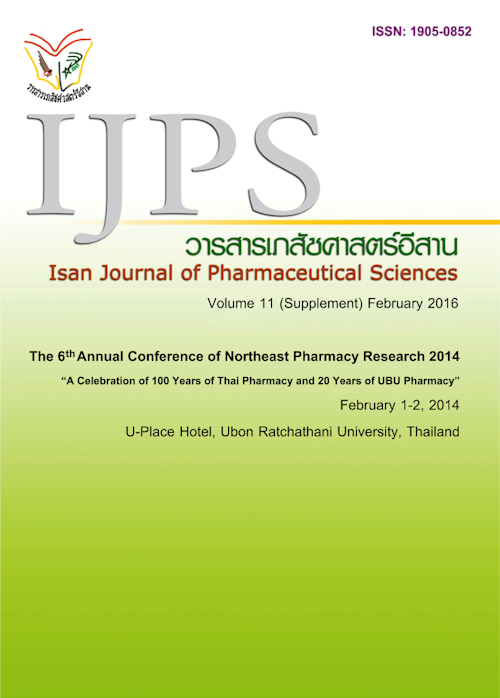Assessment of Mental Health and Stress of Students at Ubon Ratchathani University
Main Article Content
Abstract
Introduction: Studying in the University is a transition phase from adolescence into adulthood. Students get anxious as they adjust themselves for academic and social independences at the university. This may lead to stress and mental health problems. The objectives of this study were to assess mental health and stress of students at Ubon Ratchathani University and to investigate what student characteristics are associated with their mental health and stress. Materials and Method: This study is a descriptive cross-sectional study. The sample includes all Undergraduate students of Ubon Ratchathani University who are studying during the first semester of year 2013. Data were collected by online questionnaire. In order to assess mental health and stress, two questionnaires were used respectively: Thai Mental Health Indicator Version 2007 (TMHI-15) and Department of Mental Health screening test for stress 5 (ST-5). Descriptive statistics and Chi-square were used to analyze data. Results: There were 11,498 students (86.69% of total students) who completed online questionnaires. The results showed that students with good and fair mental health were 72.40%. Most students had normal stress level 77.98%. Mental health and stress were associated significantly with gender, study area, year of study, grades and income (p < 0.05). Most participants reported ways to manage stress include (1) relax themselves by other activities, (2) seeking consultant and (3) exercise (94.03%, 57.92% and 55.04% respectively). Parents and family, friends at the university and from high school were the top three consultants ranked by most respondents. The subjects suggested that the university should provide a pleasant environment for recreation and physical exercise as well as mental health care. Conclusion: Ubon Ratchathani University students at 2013 had good mental health and do not have any serious stress level. However, University should consider providing mental health care for students with problems as well as developing facilities to promote metal health for all students.
Article Details
In the case that some parts are used by others The author must Confirm that obtaining permission to use some of the original authors. And must attach evidence That the permission has been included
References
Boonpume N. Stress and Coping of Thai traditional Medicine Students of Rajamangala University of Technology Thanyaburi. Thesis. 2010. Silpakorn University.
Chunil M, Rakjanya P, Pongsapich C. Students’ Techniques in Managing Stress at King Mongkut’s Institute of Technology North Bangkok. J Indus Tech. 2007: 3(2).
Limpanawas P. Stress, coping with stress and adjust- ment of undergraduate students in Bangkok Metropolis. Thesis. 2006 Kasetsart University
Ministry of Public Health. Department of Mental Health screening test for stress 5 (ST-5) [online] 2009 [cited 2013 Nov 20] Available from: http://www.dmh.go.th/test/qtest5/
Mongkol A. et al Thai Mental Health Indicator Version 2007 (TMHI-15) [online] 2009 [cited 2013 Nov 20] Available from: http://www.dmh.go.th/test/thaihapnew/thi15/thi15.asp
Rakkhajeekul S, Krisanaprakornkit T. Mental Health Survey in Medical Students in Khon Kaen University.J Psychiatr AssocThailand 2008; 53 (1):31-40.
Singkibut S. Stress and Stress management of Ubon RatchathaniUniversity Thesis. 2002. Khon Kaen University.
Suanrueang P, Jorajit S, Phantusena C. Stress, Factors Affecting Stress, and Stress Coping of Prince of Song- kla University Undergraduate Students, Hat Yai Campus. 2009. Songklanakarin J of Social Sciences & Humanities: 15 (2): 313-325.
Watcharataewinkul W. Stress, Factor Affectives Stress and Stress Removing Methods of Rajabhat Institute Nakhon Pathom Students (Research). Rajabhat Institute Nakhon Pathom 2002: 46-500
Wongsritrakool P. [online] 2011 Educational Factors Affecting Stress and Anxiety of Students in Thonburi University. [online] 2011 [cited 2013 Nov20] Availablefrom: http://www.stou.ac.th/offices/ord/pac/file/edu6.pdf


